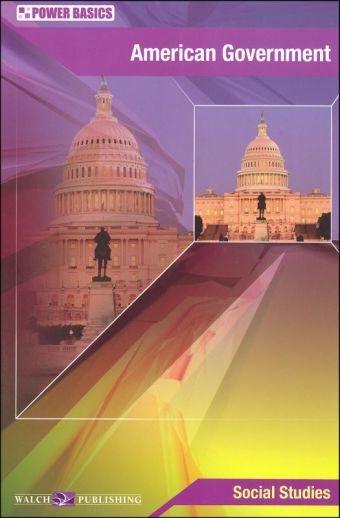We use cookies to make your experience better. To comply with the new e-Privacy directive, we need to ask for your consent to set the cookies. Learn more.
American Government Student Book (Pwr Basics)
Power Basics is a secondary world history program that covers essential skills and knowledge using an accessible format. It works well for ELL students, students reading below level, and credit recovery.
This second edition of the useful Power Basics series is stronger and more user-friendly. Targeting a student audience that is typically daunted by the length and complexity of traditional textbooks, this series provides the essentials of a junior or senior high curriculum (on-level content) with below-level readability (4th grade). Learners build literacy and critical-thinking skills as they interpret, evaluate, analyze, and synthesize scientific information. They likewise apply these skills in their daily lives. The step-by-step lessons are manageable with clearly defined examples. Workbook activities provide frequent practice and review while supporting different learning styles.
Traditional textbooks typically are written for an above-average reader, cover a wide range of content and are filled with photographs, illustrations, and other visual elements. For some students the amount of material is overpowering, the visual elements are distracting and the rapid pace is unnerving. Power Basics has streamlined the textbook approach while presenting essential content (adhering to NSE standards) allowing students to succeed.
The program has four components: student book, workbook, teacher's guide, and test packet. Single Packs, which contain all four components for a slightly discounted price are also available. Repeating, recognizable icons are used throughout the series.
Each Student Book (of varying lengths) is divided into units each of which has a series of lessons on related topics with one lesson for each topic. Each lesson begins with a clear, student-centered goal and a list of Words to Know introduced in the lessons. (Vocabulary word definitions are included in the glossary found in both the teacher's guide and the student book.) There is a brief introduction to the topic followed by instructional text that presents essential information in short, easy-to-understand sections. This is followed by a practice activity (set of questions) that lets students apply what they've just learned. Each unit concludes with a review (multiple choice questions) and several application activities. The student text has several special features: Think About It - asking students to use critical-thinking skills, Tip - useful hints to help remember specific pieces of information, and Real-Life which shows how the material connects to their own lives. Although sparing, illustrations & charts are interspersed throughout the text which also employs an accent color. A summary of rules and other important information, a glossary with pronunciation guide, and an index make up the reference section accompanying each student text. Some examples of the application activities from the World Geography text: reading maps in newspapers; learning European customs, languages, phrases; scanning newspapers and news reports for one week for stories about Russia, Central Asia, and Middle East; or pretending you are on a panel to decide if Antarctica should be considered a continent.
For each lesson the consumable Workbook provides a variety of practice and extension activities especially geared for different learning styles. Answers are provided in a separate key. Some of the activities from the World Geography series: learn location & time zones, read passage and complete diagram about changes over time, do a crossword puzzle (a frequent activity) on political division in Europe, read chart and answer questions, read tour description and write song, research Volga River and some cities that it flows through, choose one city and creating an advertising poster, create a climograph by plotting precipitation and temperature from chart and then answer questions.
The Teacher Guide gives an overview of each unit with suggestions for extension activities as well as a complete answer key to all the practice activities & unit reviews. Also provided is a chart showing how to correlate the textbook material with the workbook activities. The guide includes duplicates of the glossary and appendices from the student text. Reproducible graphic organizers (information web, Venn diagrams, and a comparison matrix) are useful homeschool tools but the Record-Keeper is more oriented to the classroom. I particularly liked the generic grading rubric for application activities. Determining how to grade projects always seemed to derail me. Some examples of extension activities from World Geography include: search internet to find out about sports in South and East Asia, read general article about aspect of African life and write report to share with class, study weather maps and consider how geography affects weather.
The Test Packet includes a pre-test and post-test as well as unit test for each unit in the student text. This packet also includes suggestions for testing students who do not test well along with test-taking strategies for both the Power Basics series and standardized testing. Out of curiosity I took the pre-test provided with the Geography series scoring 90%. It did show a hole in my knowledge - almost all of my misses were from the Eastern Europe area.
This series fills a need within the homeschool community. While not as strong or as challenging as some of our literature-based history studies or our textbook courses, those courses tend to be from Christian publishers and incorporate a biblical worldview. This series from a secular publisher provides a complete course that can be strengthened for a grade-level reader by adding appropriate reading and research projects while using the course as a study framework. ~ Janice
Seven Units: What is Government?, Constitutional Framework, Political Parties & Voting, The Federal Government, Presidential Election Process, State Government, Local Government. 225 pgs.
| Product Format: | Softcover Book |
|---|---|
| Brand: | Walch Publishing |
| Grades: | 6-12 |
| ISBN: | 9780825156526 |
| EAN/UPC: | 700507030202 |
| Length in Inches: | 9 |
| Width in Inches: | 6 |
| Height in Inches: | 0.5 |
| Weight in Pounds: | 0.7 |

